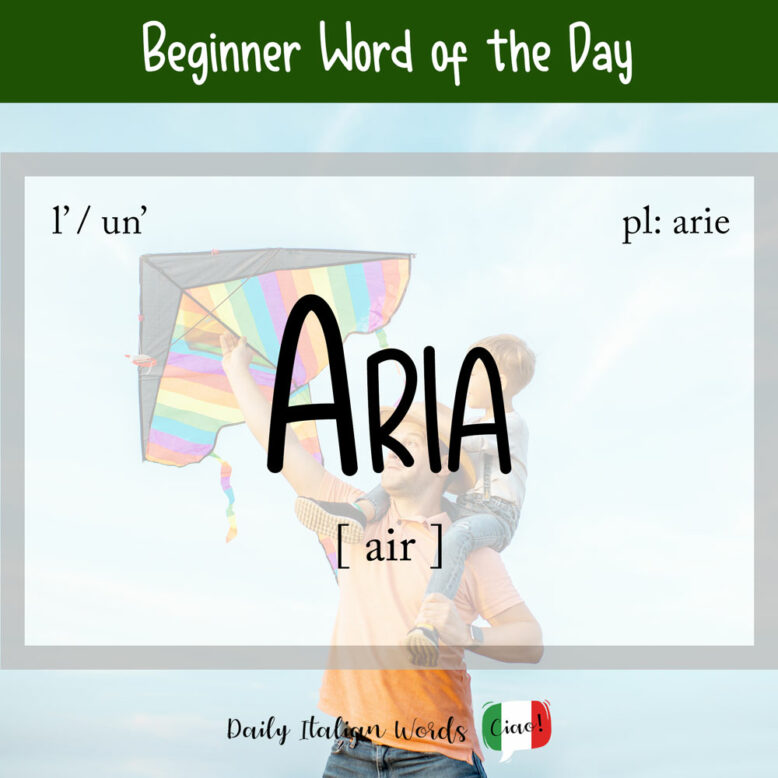Air – or aria (feminine, plural: arie) in Italian – is fundamental to all life on earth.

Without air, or more specifically oxygen (ossigeno), the human body can only survive for a few minutes before it begins to fail. In addition to being the means by which winged animals and machines fly (volare), it is also an excellent source of energy when it moves as wind (vento) and the primary vessel that transports sounds (suoni) and smells (odori).
Oggi pomeriggio c’era un’aria fredda in città.
This afternoon there was a chill in the air in the city.
There are many useful terms that contain the word aria used in its literal sense, as you can see below:
- (ventata di) aria fresca = (a breath of) fresh air
- aria pesante = stifling, stuffy
- aria aperta = outdoors
- aria condizionata = air conditioning
- aria compressa = compressed air
- tromba d’aria = tornado
- cambiare aria = to open the windows to let in fresh air
In Italian, the word aria can also be used in a figurative sense to refer to the environment, atmosphere or vibe of a place, such as a workplace or school. If everyone at your office gets along, you could say it has an un’aria positiva (lit: a positive air) whereas a toxic work environment where colleagues constantly bicker would have una brutta aria (lit: a bad air).
When referring to the look or appearance of someone, you can use the word aria plus an adjective to describe them.
Quell’uomo ha un’aria misteriosa, non credi?
That man looks mysterious, don’t you think?
Lei ha un’aria familiare ma non credo di averla mai incontrata prima d’ora.
She looks familiar but I don’t think I’ve ever met her before.
Below are a number of popular words and expressions that use aria in the figurative sense:
- tira una brutta aria = tension is high
- dare aria alla bocca = to have verbal diarrhoea
- campato in aria = unrealistic
- cambiare aria = have a change of scene
- aria fritta = empty talk
- aria assente = absent-minded, lost in thought
- far saltare in aria = to blow (something) up
- a pancia all’aria = flat on your back
- mandare all’aria = to drop / abandon (something)
- prendere una boccata d’aria = to go outside
- darsi delle arie = to be full of oneself
A uniquely Italian concept is the colpo d’aria (lit: blast of air). As summer turns to autumn and the days get cooler, the universal fear of getting hit by a blast of cold air (prendere un colpo d’aria) overrides the Italian psyche. The belief is that it is the cause of many ailments – not just fevers, chills and colds but also indigestion, headaches and unexplained aches and pains – so don’t be surprised if you receive a well-meant word of warning if you venture outside without a jacket and scarf on a cool fall day!
By the way, if you’ve heard the word aria before in English, that’s because it also has a second meaning: a long accompanied song for a solo voice in an opera. 😉
To finish off, here is a beautiful song by songwriter Gianna Nannini called, you guessed it, Aria!
Heather Broster is a graduate with honours in linguistics from the University of Western Ontario. She is an aspiring polyglot, proficient in English and Italian, as well as Japanese, Welsh, and French to varying degrees of fluency. Originally from Toronto, Heather has resided in various countries, notably Italy for a period of six years. Her primary focus lies in the fields of language acquisition, education, and bilingual instruction.


